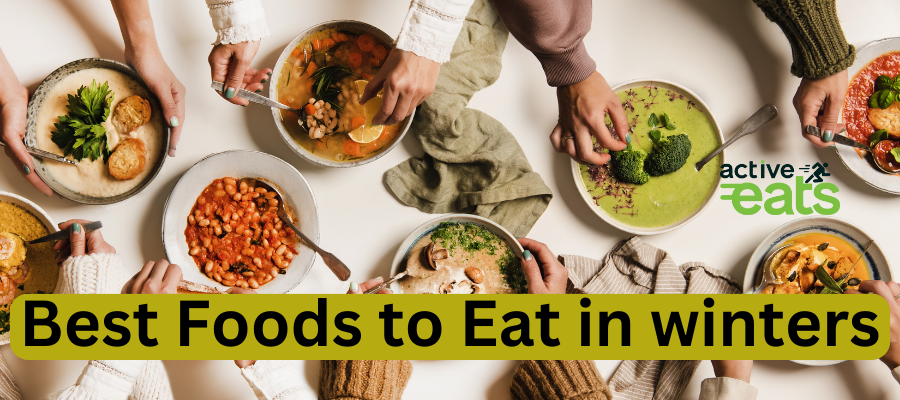Winter is a season that brings its own challenges and demands on our body. Proper nourishment and foods for winters is required to stay strong and healthy at this time. Along with this, we also require to maintain temperature of the body to support our immune system. Therefore, it is important to include such foods that provide energy as well as the warmth needed to fight the chilling weather. The best foods to attain warmth, health and satisfaction in this cold season will be talked about in this blog post. Let’s start!
Body Needs in Winters
In winters, our body needs extra nourishment to stay healthy and strong. Balanced nutritional diet is the key to maintain ideal body temperature and support immune system. It is important to eat foods that provide energy and warmth to combat the cold weather. In winters, our body needs some nutrients more than others like vitamin C, vitamin D, zinc, and omega-3 fatty acids.
Best Food for Winters
There are several delicious foods for winters that you can enjoy to keep yourself nourished and warm. Here are some of the best food options for winters:
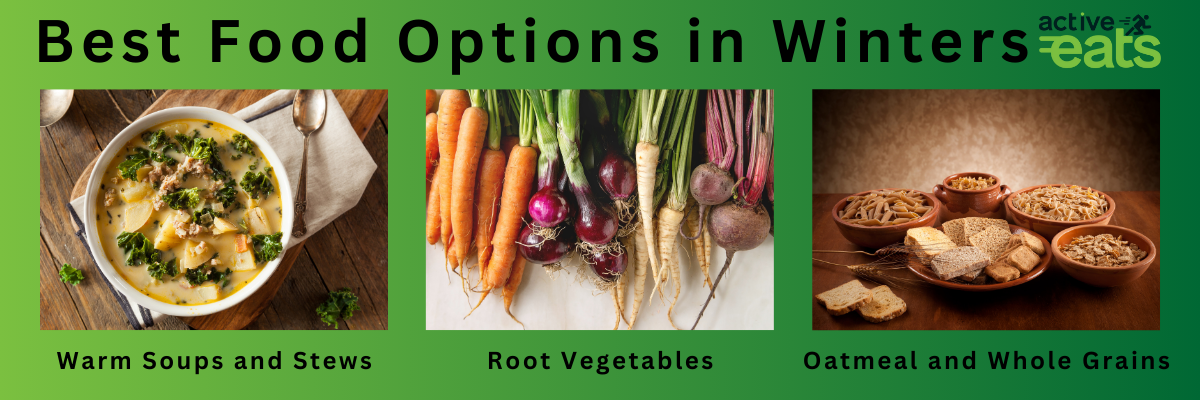
- Warm Soups and Stews: Warm soups and stews are perfect for comforting and nourishing meals during winters. With supplying important nutrients, they also help in keeping the body warm.
- Root Vegetables: Adding root vegetables like carrots, sweet potatoes, and beets to your winter diet is a great option. They are naturally sweet making it delicious to eat and abundance of vitamins and minerals are found in them.
- Oatmeal and Whole Grains: Oatmeal and whole grains are excellent sources of energy and keep you full for longer periods. They are perfect for warming breakfasts or snacks in evening during winters.
Best Nuts and Dry Fruit Foods for Winters
Nuts are a nutritious snack option during winters. They play an equal role in providing essential nutrients as well as keeping the body warm. Here are some of the best nuts to include in your winter diet:
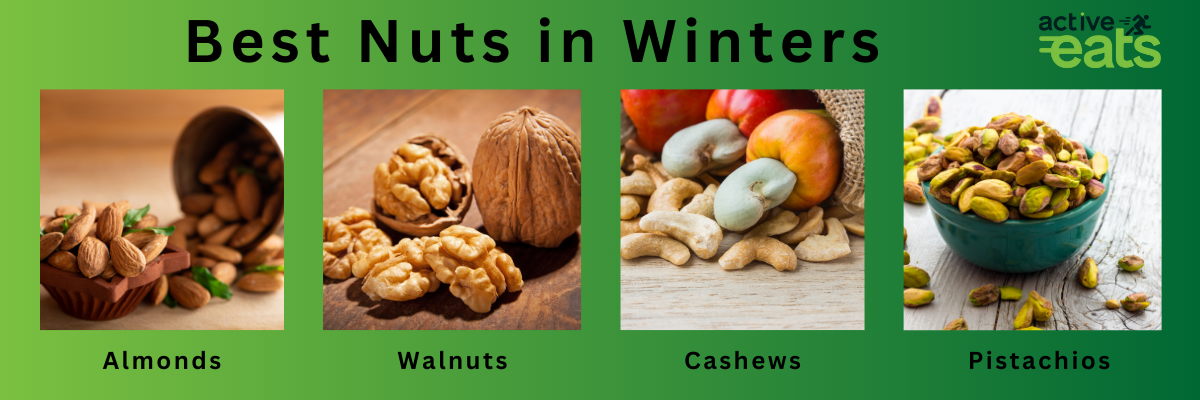
Almonds: Rich in omega-3 fatty acids, almonds are known to provide warmth to the body.
Walnuts: Another excellent source of omega-3 fatty acids, walnuts are great supporter of heart health and are also packed with antioxidants.
Cashews: Cashews are high in healthy fats and protein. During winters, cashews could be considered as a tasty and filling snack option.
Pistachios: Being low in calories, pistachios are a great option for snacking as they are packed with nutrients and are a good source of plant-based protein and healthy fats.
By including these nuts in your diet, many health benefits including, better cholesterol levels and improved heart health, can be attained.
Top 10 Seeds to Eat in Winters
Seeds are packed with essential nutrients and are ideal for winter snacking. Here are the top 10 seeds to include in your diet:
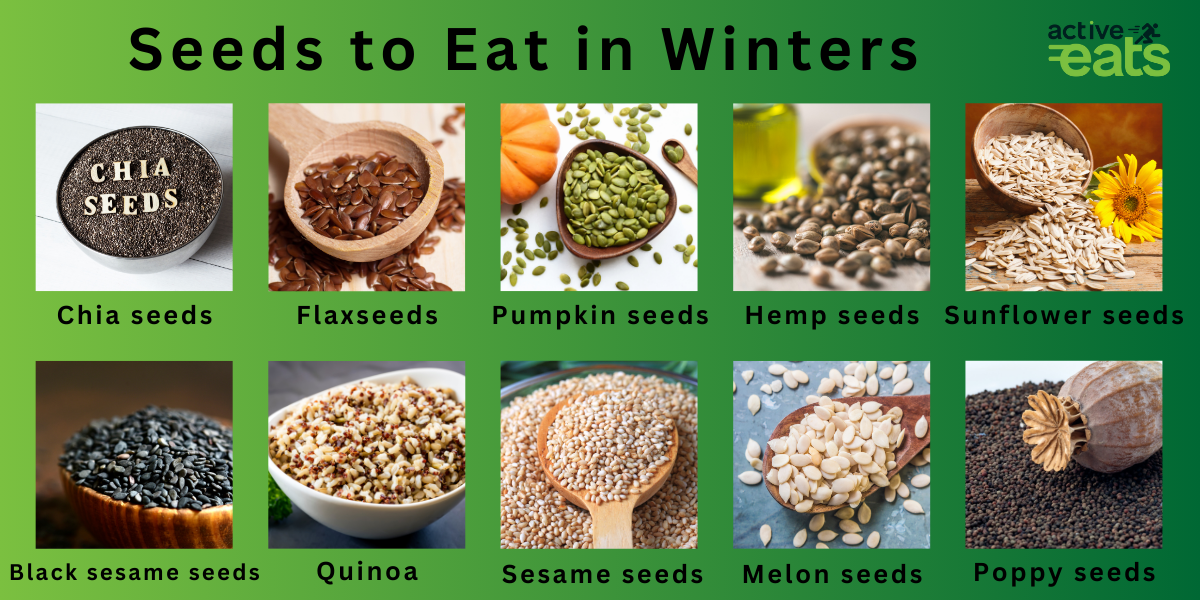
Chia seeds: Rich in omega-3 fatty acids, chia seeds provide energy and are a versatile addition to your meals.
Flaxseeds: These seeds are high in fiber and help maintain digestive health. They can be made a part to oatmeal, smoothies, or baked goods.
Pumpkin seeds: High in zinc, pumpkin seeds support the immune system and can be enjoyed as a snack or added to salads and soups.
Sunflower seeds: These seeds are a good source of vitamin E and provide a crunchy texture to salads and baked goods.
Sesame seeds: Rich in calcium and iron, sesame seeds can be sprinkled on stir-fries, salads, or used in tahini sauce.
Hemp seeds: Hemp seeds are a complete source of protein and are rich in omega-3 fatty acids. They can be added to smoothies or sprinkled on yogurt.
Poppy seeds: These little seeds are packed with minerals like calcium and magnesium. They can be used with salads or in baking.
Black sesame seeds: Similar to regular sesame seeds, black sesame seeds are also rich in nutrients and can be used in savory or sweet dishes.
Quinoa: Although technically a pseudo-grain, quinoa is a great source of protein and can be enjoyed as a warm side dish or in salads.
Melon seeds: These seeds are high in antioxidants and can be roasted and enjoyed as a snack.
Including these nutritious seeds in your winter diet can provide various health benefits and add flavor and texture to your meals.
Home Made Foods for Winters
Preparing homemade meals in winters can be a healthier and cost-effective option. Soups, stews, and casseroles made with fresh ingredients are nutritious and comforting. Home-cooked meals allow you to control the quality and quantity of ingredients used. Different delicious and flavorful cuisine can be prepared by combination of various spices.
Immunity Booster Foods for Winters
Boosting immunity is essential during winters to protect against common colds and flu. Here are some foods for winters that can help strengthen your immune system:
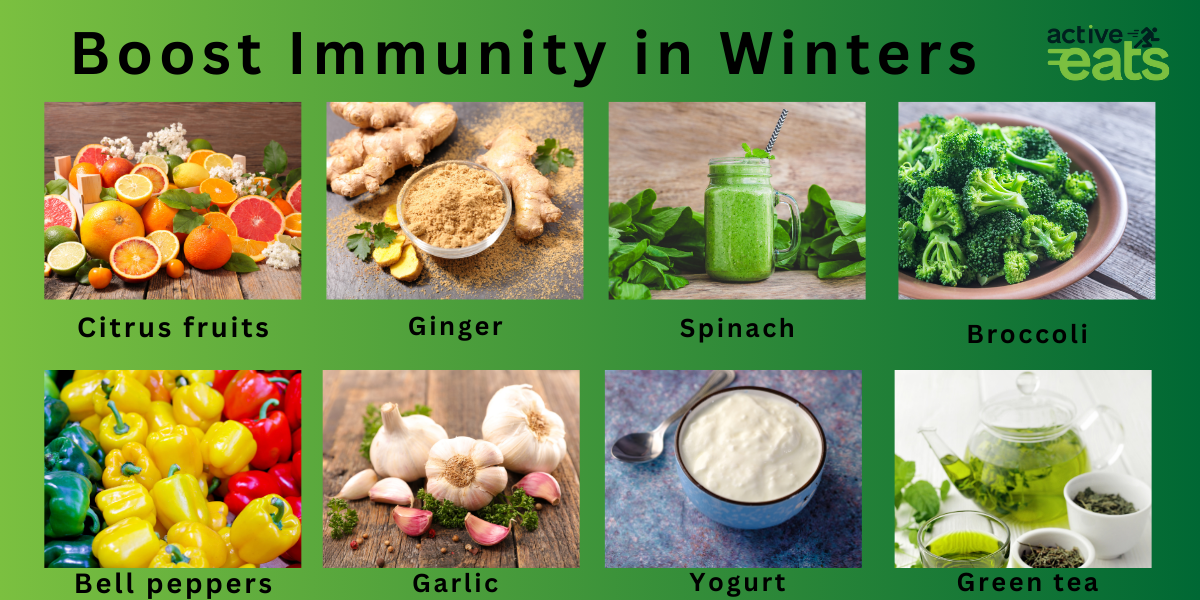
Citrus fruits: Rich in vitamin C, citrus fruits like Oranges, grapefruits, and lemons helps stimulate the production of white blood cells and antibodies.
Bell peppers: These colorful vegetables are also high in vitamin C and provide antioxidants that support immune function.
Garlic: It helps in fighting infections because of its known antibacterial and antiviral properties.
Ginger: Known for its warming properties, ginger has immune-boosting benefits and can help soothe symptoms of illness.
Yogurt: Including probiotic-rich foods like yogurt can boost immunity by promoting the growth of beneficial gut bacteria.
Spinach: Heavily packed with vitamins A and C, as well as antioxidants, spinach could be considered a great vegetable for winter meals.
Broccoli: It is full of fiber and antioxidants along with many essential vitamins like vitamins A, C, and E that enhance immune system function.
Green tea: Rich in antioxidants, green tea can help strengthen the immune system and keep you hydrated during winters.
To boost your body’s immune system and stay fit during winter season, these nutrient dense foods for winters can be added in the diet.
Foods for Winters to Keep You Warm
Certain foods can help keep you warm from the inside during winters.
Here are some foods for winters options:
- Hot beverages: Herbal teas and warm milk can provide instant warmth and comfort.
- Spices: Cinnamon, turmeric, and ginger help increase body heat and improve circulation.
- Natural fats: Including foods with natural fats like avocados and olive oil can provide insulation and keep you warm.
By incorporating these foods into your diet, you can stay warm and cozy during the winter season.
5 food recipes to keep your body warm during winters
Vegetable Stew: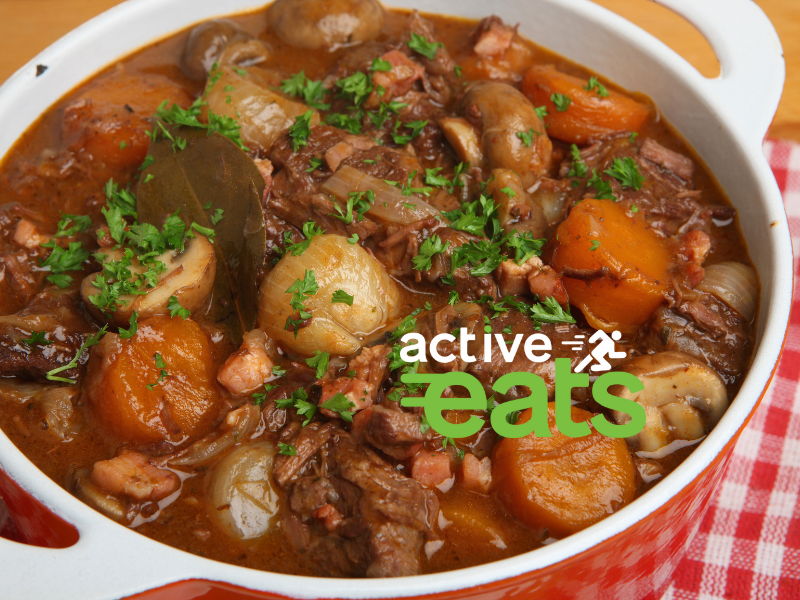
- Ingredients:
- Mixed vegetables (carrots, potatoes, peas, celery, etc.)
- Onion, garlic, and ginger (chopped)
- Vegetable broth
- Canned tomatoes (diced)
- Bay leaves, thyme, and rosemary
- Salt and pepper to taste
- Instructions:
- Sauté onions, garlic, and ginger in a pot until fragrant.
- Add mixed vegetables and cook for a few minutes.
- Pour in vegetable broth, add tomatoes, bay leaves, thyme, and rosemary.
- Simmer until vegetables are tender. Season with salt and pepper.
Chicken and Rice Soup: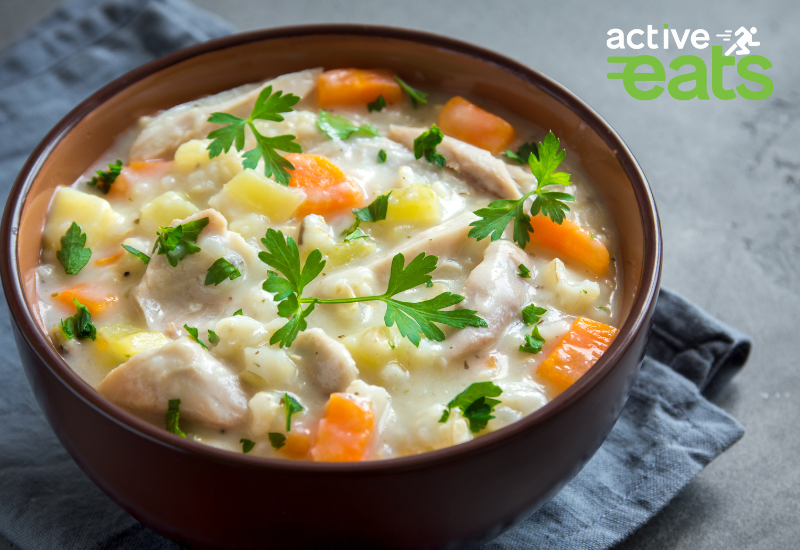
- Ingredients:
- Chicken breasts or thighs
- Rice
- Carrots, celery, and onion (chopped)
- Chicken broth
- Garlic (minced)
- Bay leaves
- Salt and pepper to taste
- Instructions:
- Cook chicken in a pot until browned. Remove and set aside.
- Sauté garlic, carrots, celery, and onion until softened.
- Add chicken back to the pot, pour in chicken broth, and add bay leaves.
- Simmer until chicken is cooked. Add rice and cook until tender.
Butternut Squash Risotto: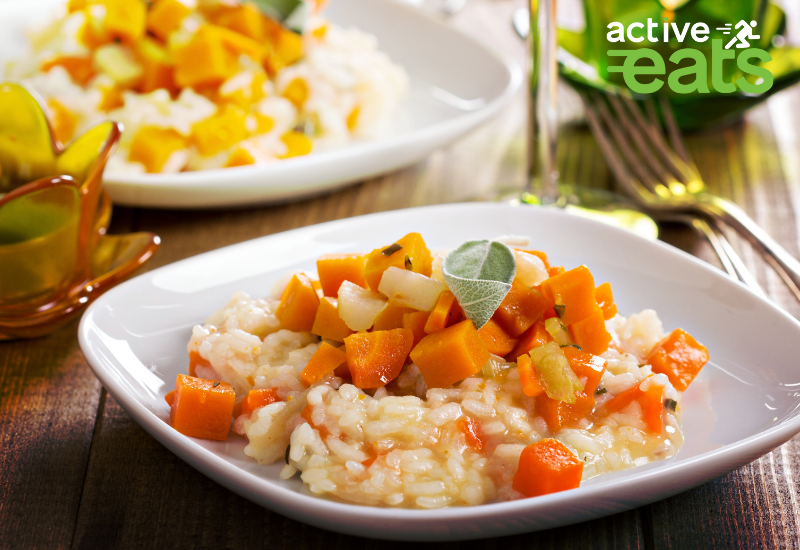
- Ingredients:
- Arborio rice
- Butternut squash (peeled and diced)
- Onion and garlic (chopped)
- Vegetable or chicken broth
- White wine
- Parmesan cheese
- Sage leaves
- Salt and pepper to taste
- Instructions:
- Sauté onion and garlic in a pan. Add rice and cook until translucent.
- Pour in white wine and let it absorb. Add broth gradually while stirring.
- In a separate pan, cook butternut squash and sage.
- Mix the squash mixture into the risotto. Top it with Parmesan cheese.
- Sprinkle salt, and pepper.
Lentil Soup: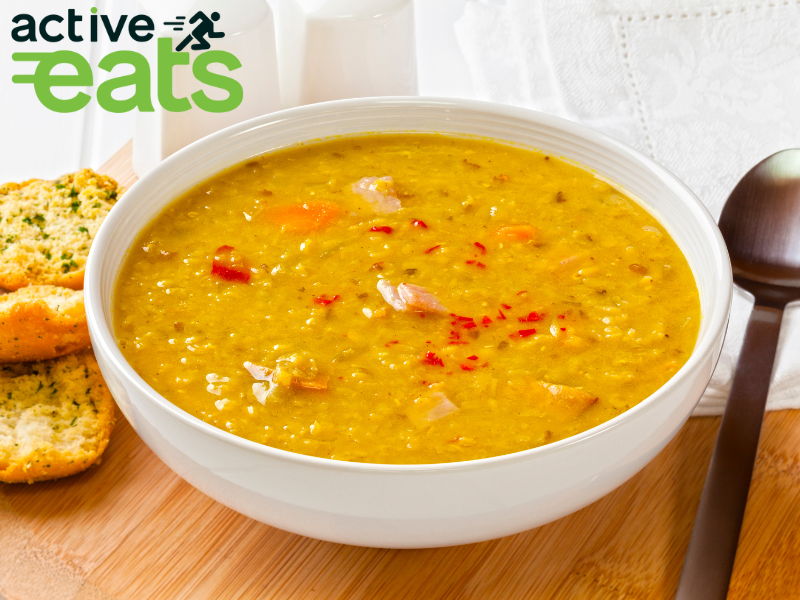
- Ingredients:
- Lentils
- Carrots, celery, and onion (chopped)
- Garlic (minced)
- Vegetable or chicken broth
- Cumin, coriander, and turmeric
- Lemon juice
- Salt and pepper to taste
- Instructions:
- Sauté garlic, carrots, celery, and onion until softened.
- Add lentils, broth, and all spices. Simmer until lentils are tender.
- Stir in lemon juice, salt, and pepper. Adjust seasoning if needed.
These nutrition packed and mouth-watering recipes are great to enjoy for warmth and satisfaction with health benefits during the winter months.
Conclusion
In conclusion, it is important to prioritize our body’s needs during winters to stay healthy and strong. It is necessary to boost immune system and maintain ideal body temperature by having nutritious diet which includes foods that provide strength and warmth in the cold weather. For increasing immunity, foods which are rich in vitamin C, vitamin D, zinc, and omega-3 fatty acids should be included in the diet.
During winters, there are plenty of flavorful food options to enjoy. Warm soups, stews, and root vegetables like carrots and sweet potatoes are comforting during cold weather. Heart health can be improved by addition of nuts and seeds to different dishes.
Preparing homemade meals allows for greater control over ingredients, ensuring a healthier and cost-effective option. Experimenting with different flavors and spices can create warm and flavorful dishes.
Ginger, garlic, probiotics and vitamin C rich food can be beneficial in immunity boosting. Additionally, consuming hot beverages and including foods with natural fats can help keep you warm from the inside.
Balanced diet and correct choice of food is the key for healthy and fit life during the winter season.

